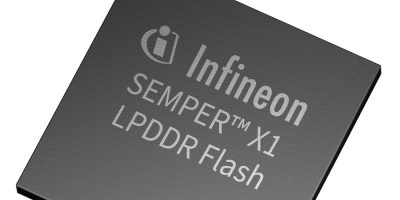LPDDR flash memory executes real time code for automotive controllers
Believed to be the first LPDDR (low power double data rate) available, the Semper X1 LPDDR flash has been released by Infineon to enable next generation automotive electronic / electrical (E/E) architectures. It offers safe, reliable and real-time code execution which is critical for automotive domain and zone controllers. The device delivers eight times the performance of current NOR flash memories and achieves 20 times faster random read transactions for real time applications. This enables software-defined vehicles to deliver advanced features with enhanced safety and architectural flexibility.
These vehicles rely on multi-core processors developed on advanced manufacturing processes to meet the demands for vehicle intelligence, connectivity and complexity, said Infineon. Higher density embedded non-volatile memories are no longer a viable cost option at these advanced nodes, explained Infineon and system architects need to consider using external NOR for code storage. These complex processors demand more memory performance which promoted Infineon to develop the Semper X1 with an LPDDR4 interface operating at 3.2Gbytes per second and a multi-bank architecture to meet the performance and density requirements of domain and zone controllers.
“With the drive towards semi-autonomous vehicles and more sophisticated engine control, real-time decisions are critical to the dependability and safety of the vehicle and driver,” said Jim Handy, general director of the semiconductor market research firm Objective Analysis. “Infineon’s LPDDR Flash memory should address these needs . . . providing real-time execute-in-place (XiP) memory and enabling it to scale independently of the processor.”
The Semper X1’s performance enables fast random read transactions for real time code execution. The multi-bank architecture supports over the air firmware updates with zero downtime. The flash memory is ISO26262 ASIL-B -compliant and sampling now with commercial availability scheduled for 2024.




